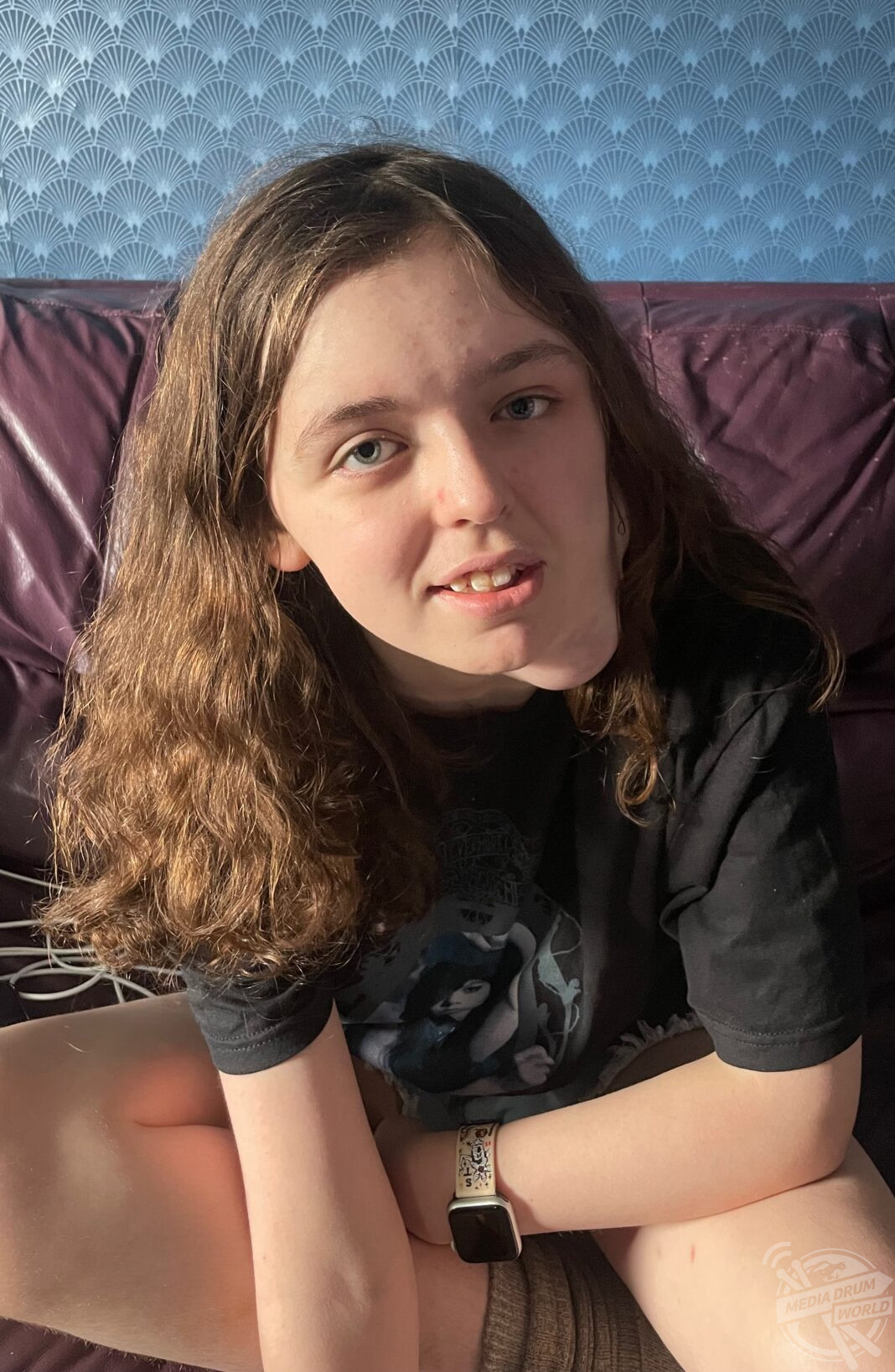By Rebecca Chitolie
THIS BRAVE GIRL was misdiagnosed three times before it was found her innocent seeming mole was in fact part of a rare life-threatening condition that has left her disfigured and living as a virtual hermit.
Fourteen-year-old Jenni Hazell-Darby had a benign bleeding mole which was the first sign of a rare faulty gene, which has caused her various growths including a life-threatening mass in her neck that is preventing her from going outside and had seriously damaged her confidence.
The lump in her neck has grown so large it is now affecting her brain, leaving her parents with no option but to spent over £300 per month travelling to hospitals for the treatment they are still unsure will cure her.
Full-time carer and mother of Jenni, Elaine Hazell-Darby (42) and her husband Dave (43) a manager from Burton-upon-Trent in Staffordshire, both live with their two daughters Jenni (14) and Chloe (22) and son Chris (24).
Since Jenni’s neck lump, called an arteriovenous malfunction (AVM) became so large as to affect her brain and cause seizures, Jenni said that people’s comments in the street have affected the family.
“Before we discovered Jenni‘s AVM she was quite an active, cheeky child. I had always suspected that she may have autism based on our experience with her elder brother, but she’s always been quite high functioning”, said Elaine.
“Since discovering her AVM her personality has changed, she is less confident, suffers from anxiety and at times does not want to leave the house.

“Jenni tries to hide her AVM with her hair. When we are out in public people are physically shocked when they notice Jenni‘s AVM.
“They will stop and stare at her in the street. We have also had people point at her and make comments.
“One day a woman noticed and said, ‘Jesus look at that.”
Jenni was five when her parents noticed she had a large mole on her back that kept bleeding and she had an operation to remove it. The mole was sent off for testing and the results came back as benign.
In September 2018, when Jenni was nine, her sister Chloe was putting Jenni‘s hair into a ponytail when she noticed a small lump next to her left ear. Elaine, Jenni’s mother, took Jenni to the GP who suspected that her glands were affected due to a recent cold.
Elaine took her to the GP three-times and was told that the lump was not a cause for concern.
“Jenni had recently had a virus so her GP said he thought it was connected to that and would disappear in a few days,” said Elaine.
“After a couple of weeks, the swelling was still there and appeared slightly bigger so we returned to her GP who said he would refer her to the hospital.
“A hospital appointment was arranged, but a couple of days before we were due to go Jenni complained of the swelling being painful, so we returned to our doctor’s surgery but this time we saw a different doctor.
“It was this doctor who noticed that the lump was pulsating. He told me that he believed it was a problem with Jenni‘s blood vessels and that we needed to be careful that she didn’t knock the swelling and that physical activity should be avoided.”
Elaine was then made aware of Jenni‘s AVM for the first time at an MRI scan, which caused trauma for Jenni who has autism.
“He said to go to the hospital appointment as arranged and explain what he had found. It was after this appointment that I cried over Jenni‘s AVM for the first time.
“We went to Royal Stoke hospital and the doctor called in his colleague and they both confirmed that the swelling was pulsating and was a suspected AVM.
“We were told that AVMs are rare and can be very difficult to treat and are prone to grow back even after treatment. We were told that Jenni would need an MRI scan to confirm it was an AVM and if it was, they would refer her to Birmingham Children’s Hospital.
“Jenni had an MRI scan soon afterwards, but no one prepared us for the experience. We didn’t know how an MRI scan worked or how noisy they were, and Jenni did not cope with the experience well.
“They kept her in the machine for 90 minutes and during this time she was so traumatised that she was crying.
“She sees a psychologist because of her anxiety regarding hospitals and it all stems back to this first MRI scan.”
By the time Jenni was seen at Birmingham Children’s Hospital, Jenni had developed a constant pulsatile tinnitus in her left ear and medics measured her AVM lump as 2.5 centimetres in size.
“They said that the treatment was an embolisation procedure, where either a glue substance or metal coils are used to block off the blood vessels, and then surgery to remove the AVM would follow,” said Elaine.
“There would be a wait for this treatment as Jenni was not classed as urgent as her AVM was not in her brain.
“Then Covid happened which caused even more delays.”
Doctors then referred Jenni for genetic testing at London’s Great Ormond Street Hospital and the distraught parents were told Jenni had the rare PTEN mutation.
From March 2021 Jenni had to endure a total of five embolisation procedures.
“Just before the third embolisation, we discovered that Jenni had significant hearing loss in her left ear because of the AVM. After the fourth embolisation she developed a facial palsy due to damage to her nerves during the procedure,” said Elaine.
“She has since regained some use of her facial muscles, however she cannot cry from her left eye and cannot drink from a cup.
“The facial palsy greatly affected her confidence and she did not want people to see her face. On the way home from the hospital she was so anxious about what people would say, she made herself sick.”
From September 2022, Jenni, who was then just 13, had a seizure for the first time.
“Her doctors reviewed her case and just before Christmas 2022 we were told further embolisations and surgery was no longer an option as her AVM was too large and the risk of bleeding was too high,” said Elaine.
“I was heartbroken by this development, as her mother I just wanted to make Jenni better.
“A few days before Christmas 2022 Jenni had a second seizure which she was hospitalised for and then put on seizure medication.
“Shortly after this we discovered that her AVM was starting to affect her heart and she was later diagnosed with high output heart failure. She cannot take any medication for her heart as they would actually make her AVM worse.”
Jenni was then started on a medication called Rapamune, which is an immunosuppressant that medics hoped would stop her AVM growing, however the treatment has not worked according to Elaine.
“In July 2023 we were told that we were running out of treatment options for Jenni,” she said.
“We were told we only had one option left and that was a trial drug called Trametinib.
“This is a drug usually given to treat skin cancer but her doctors hope that when combined with Rapamune it will slow the growth of her AVM and maybe relieve some of the pressure on her heart. Jenni started this drug in November 2023. She has had quite a few side effects such as acne, sickness and hair thinning and we do not know if this new drug is helping.
“Since starting on seizure medication, Jenni has been seizure free but the doctors have told us due to the size of Jenni‘s AVM that three things are likely to happen. She will experience more frequent and serious seizures, her AVM will rupture resulting in an instant life-threatening bleed or her heart will ultimately fail.
“Her AVM now covers a large area on the left side of her head and neck. There is also a large area by her ear and the AVM can also be felt on the top of her head. Because of the usual shape it is difficult to measure its size.”
Elaine said support from social services and her school have been minimal. She is currently waiting to hear back from a referral made for palliative care at her local children’s hospice.
“Jenni has not attended school since September 2022. In September 2022, when Jenni had her first seizure the school called a meeting where they said they could not care for Jenni with her medical needs and that the staff had anxiety because of her condition. The SENCO department thought it was best if Jenni stayed at home until a solution was found.
“Therefore, since then Jenni has not attended school, she instead receives six hours of home tutoring arranged by the school.
“She has also developed anxiety regarding attending school and fears how the other children will react to her.
“We are currently spending around £300 a month on travelling to Jenni‘s hospital appointments too.”
Elaine shared her advice for parents caring for a seriously ill child.
“Caring for a seriously ill child is incredibly difficult. You have to try and take one day at a time and try not to dwell on what may happen. I know this is easier said than done”, said Elaine.
“You will have good days and bad days and it’s ok to have a bad day. Talk to people, that could be friends, family, or a psychologist, it will help. Even though it won’t change anything you will feel better talking about things.
“Try to be honest and open with your child, your instinct will be to try and protect your child from what’s happening and how you are feeling but no matter how hard you try to hide it, your child knows you and they will sense something is wrong and that can cause them more stress.
“Look for support that could be from charities, your child’s school or online groups, the right support makes all the difference.
“And most importantly make memories that bring joy to your child.”
Elaine has set up a GoFundMe page for her daughter: https://www.gofundme.com/f/
ENDS










